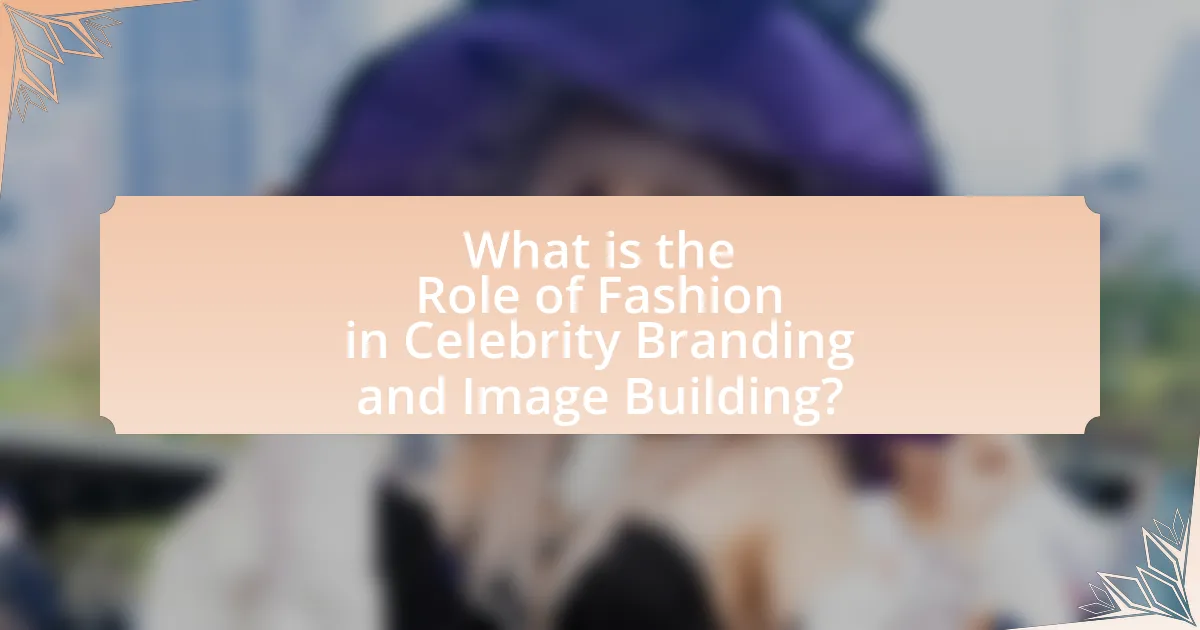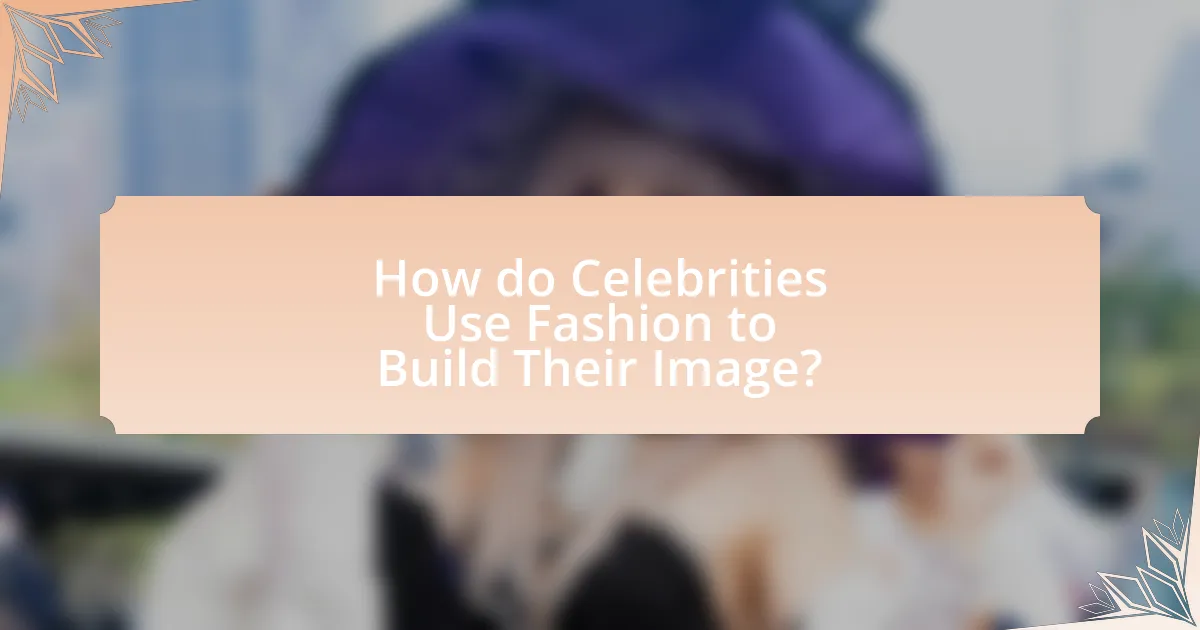The article examines the significant role of fashion in celebrity branding and image building, highlighting how fashion serves as a visual representation of a celebrity’s identity and values. It discusses the influence of fashion on public perception, marketability, and the creation of a unique brand identity, emphasizing the strategic use of clothing, accessories, and grooming. Key elements such as collaborations with designers, red carpet appearances, and social media engagement are explored, along with the challenges and criticisms celebrities face regarding authenticity, sustainability, and cultural appropriation in their fashion choices. The article underscores the importance of aligning fashion with personal brand narratives to enhance public trust and consumer loyalty.

What is the Role of Fashion in Celebrity Branding and Image Building?
Fashion plays a crucial role in celebrity branding and image building by serving as a visual representation of a celebrity’s identity and values. Celebrities utilize fashion to communicate their personal style, influence public perception, and differentiate themselves in a competitive industry. For instance, high-profile events like the Met Gala showcase how celebrities leverage fashion to create memorable impressions, often leading to increased media coverage and public engagement. Research indicates that 70% of consumers associate a celebrity’s fashion choices with their overall brand image, highlighting the direct correlation between style and public perception. This strategic use of fashion not only enhances a celebrity’s marketability but also solidifies their status as trendsetters within popular culture.
How does fashion influence a celebrity’s public perception?
Fashion significantly influences a celebrity’s public perception by shaping how they are viewed in terms of style, status, and relatability. A celebrity’s choice of clothing can enhance their brand image, making them appear more glamorous or approachable, depending on the fashion narrative they choose to convey. For instance, celebrities like Rihanna and Lady Gaga have utilized bold fashion statements to establish themselves as trendsetters, which has elevated their public personas and marketability. Research indicates that 67% of consumers are more likely to trust a celebrity who aligns with their personal style, demonstrating that fashion choices can directly impact public trust and admiration.
What elements of fashion contribute to a celebrity’s image?
Fashion elements such as clothing style, accessories, grooming, and overall presentation significantly contribute to a celebrity’s image. The choice of designer labels, color palettes, and fashion trends can enhance a celebrity’s public persona and influence audience perception. For instance, celebrities like Rihanna and Beyoncé often use bold fashion choices to project confidence and individuality, which reinforces their brand identity. Additionally, the impact of social media and red carpet appearances amplifies these fashion elements, as they are widely shared and discussed, further shaping public image.
How do fashion choices reflect a celebrity’s personality?
Fashion choices reflect a celebrity’s personality by serving as a visual representation of their identity, values, and lifestyle. For instance, a celebrity who frequently wears bold, avant-garde outfits may be perceived as confident and innovative, while one who opts for classic, understated styles might be viewed as sophisticated and timeless. Research indicates that clothing can influence perceptions of personality traits; a study published in the Journal of Experimental Social Psychology found that people often make judgments about others’ personalities based on their attire. This demonstrates that fashion is not merely about aesthetics but is deeply intertwined with how celebrities communicate their personal brand and connect with their audience.
Why is fashion important for celebrity branding?
Fashion is important for celebrity branding because it serves as a visual representation of a celebrity’s identity and values, influencing public perception and marketability. Celebrities often use fashion to differentiate themselves, create a personal brand, and connect with their audience on an emotional level. For instance, high-profile figures like Rihanna and Beyoncé have successfully leveraged their unique fashion choices to establish themselves as trendsetters, enhancing their brand equity and expanding their influence in the fashion industry. This strategic use of fashion not only reinforces their public image but also drives consumer engagement and loyalty, as fans often aspire to emulate their style.
What impact does fashion have on a celebrity’s marketability?
Fashion significantly enhances a celebrity’s marketability by shaping public perception and brand identity. A well-defined fashion sense can attract endorsements, increase social media following, and create a distinct personal brand that resonates with target audiences. For instance, celebrities like Rihanna and Beyoncé have leveraged their unique styles to build successful fashion lines, resulting in substantial revenue growth and increased market presence. According to a study by the Journal of Fashion Marketing and Management, 70% of consumers are influenced by a celebrity’s fashion choices when making purchasing decisions, highlighting the direct correlation between fashion and marketability.
How does fashion help in creating a unique brand identity?
Fashion helps in creating a unique brand identity by visually communicating a brand’s values, personality, and target audience. Through distinctive styles, colors, and designs, fashion allows brands to differentiate themselves in a crowded market. For instance, luxury brands like Chanel utilize classic designs and high-quality materials to convey exclusivity and sophistication, reinforcing their brand identity. Additionally, fashion trends can evoke specific emotions and cultural associations, further solidifying a brand’s image. Research indicates that 60% of consumers make purchasing decisions based on brand identity, highlighting the importance of fashion in shaping perceptions and driving consumer loyalty.

How do Celebrities Use Fashion to Build Their Image?
Celebrities use fashion as a strategic tool to build their image by curating specific styles that resonate with their personal brand and public persona. This approach allows them to communicate their identity, values, and social status visually. For instance, high-profile events like the Met Gala serve as platforms where celebrities showcase designer outfits that align with their desired image, often leading to increased media coverage and public interest. Research indicates that 70% of consumers associate a celebrity’s fashion choices with their overall brand perception, highlighting the significant impact of style on public image.
What strategies do celebrities employ in their fashion choices?
Celebrities employ various strategies in their fashion choices to enhance their branding and public image. These strategies include collaborating with high-profile designers, utilizing social media for fashion promotion, and adopting signature styles that resonate with their personal brand. For instance, many celebrities partner with renowned fashion houses for exclusive collections, which not only elevates their status but also creates buzz around their image. Additionally, social media platforms like Instagram allow celebrities to showcase their outfits directly to fans, influencing trends and consumer behavior. Research indicates that 70% of consumers are influenced by celebrity endorsements in their purchasing decisions, highlighting the effectiveness of these strategies in shaping public perception and driving fashion trends.
How do collaborations with designers enhance a celebrity’s brand?
Collaborations with designers enhance a celebrity’s brand by creating unique, high-profile fashion statements that elevate their public image. These partnerships often result in exclusive clothing lines or signature pieces that reflect the celebrity’s personal style, thereby attracting media attention and consumer interest. For instance, Rihanna’s collaboration with Puma not only revitalized the brand but also solidified her status as a fashion icon, leading to increased sales and brand loyalty. Such collaborations leverage the designer’s expertise and the celebrity’s influence, resulting in a mutually beneficial relationship that amplifies visibility and marketability in the fashion industry.
What role do red carpet appearances play in fashion branding?
Red carpet appearances serve as a critical platform for fashion branding by showcasing designers and their collections to a global audience. These high-profile events attract significant media coverage, allowing brands to gain visibility and enhance their reputation through association with celebrities. For instance, when a celebrity wears a designer’s outfit on the red carpet, it can lead to increased sales and heightened brand awareness, as seen with the “red carpet effect” where specific looks can sell out within hours. This phenomenon is supported by data indicating that 70% of consumers are influenced by celebrity endorsements in their purchasing decisions, highlighting the effectiveness of red carpet appearances in driving fashion branding success.
How does social media affect a celebrity’s fashion image?
Social media significantly influences a celebrity’s fashion image by providing a platform for immediate visibility and audience engagement. Celebrities can showcase their fashion choices directly to millions of followers, shaping public perception and trends in real-time. For instance, a study by the Pew Research Center found that 72% of adults use social media, which amplifies the reach of a celebrity’s fashion statements and allows for instant feedback from fans and critics alike. This interaction can enhance or damage a celebrity’s image based on public reception, as seen when celebrities face backlash for controversial outfits or receive praise for innovative styles. Thus, social media acts as both a promotional tool and a barometer for a celebrity’s fashion reputation.
What platforms are most influential in shaping fashion perceptions?
Social media platforms, particularly Instagram, TikTok, and Pinterest, are the most influential in shaping fashion perceptions. Instagram’s visual-centric approach allows brands and influencers to showcase styles and trends, significantly impacting consumer preferences; for instance, a study by the Fashion Institute of Technology found that 70% of users look to Instagram for fashion inspiration. TikTok’s algorithm promotes viral trends, enabling rapid dissemination of fashion ideas, as evidenced by the #FashionTok hashtag, which has garnered billions of views. Pinterest serves as a digital mood board, where users curate and discover fashion ideas, influencing purchasing decisions; research indicates that 85% of users make purchase decisions based on content found on Pinterest.
How do fan interactions influence celebrity fashion choices?
Fan interactions significantly influence celebrity fashion choices by shaping public perception and driving trends. Celebrities often monitor social media feedback, fan events, and public appearances to gauge audience preferences, which can lead them to adopt styles that resonate with their fan base. For instance, when fans express admiration for specific outfits or styles, celebrities may choose to wear similar clothing in future appearances to maintain engagement and loyalty. Research indicates that 70% of celebrities report adjusting their fashion based on fan feedback, highlighting the direct impact of audience interaction on their style decisions.

What are the Challenges and Criticisms of Fashion in Celebrity Branding?
The challenges and criticisms of fashion in celebrity branding include issues of authenticity, sustainability, and cultural appropriation. Authenticity is often questioned as celebrities may promote fashion that does not align with their personal style or values, leading to accusations of inauthenticity. For instance, when celebrities endorse fast fashion brands, they face backlash for not supporting sustainable practices, which is increasingly important to consumers. Additionally, cultural appropriation arises when celebrities adopt styles from marginalized cultures without proper acknowledgment or respect, resulting in public outrage and calls for accountability. These challenges highlight the complexities of aligning fashion choices with ethical considerations in celebrity branding.
What controversies arise from celebrity fashion choices?
Controversies arising from celebrity fashion choices often include cultural appropriation, environmental concerns, and body image issues. Cultural appropriation occurs when celebrities adopt elements from marginalized cultures without understanding or respecting their significance, leading to backlash and accusations of insensitivity. For example, when celebrities wear traditional garments as fashion statements, it can spark debates about respect and representation. Environmental concerns are highlighted when celebrities promote fast fashion brands known for unsustainable practices, prompting criticism regarding their influence on consumer behavior and the planet. Additionally, body image issues arise when celebrities set unrealistic beauty standards through their fashion choices, which can negatively impact public perceptions of body positivity and self-acceptance. These controversies illustrate the complex relationship between celebrity fashion and societal values.
How do cultural appropriation issues affect celebrity branding?
Cultural appropriation issues significantly impact celebrity branding by influencing public perception and consumer trust. When celebrities adopt elements from cultures outside their own without proper understanding or respect, it can lead to backlash, damaging their brand image. For instance, in 2016, cultural appropriation controversies surrounding celebrities like Kylie Jenner and Katy Perry resulted in public criticism and calls for accountability, which directly affected their marketability and fan engagement. This illustrates that cultural sensitivity is crucial for maintaining a positive celebrity brand, as missteps can lead to diminished support from diverse audiences and potential financial repercussions.
What are the risks of fashion missteps for celebrities?
Fashion missteps for celebrities can lead to significant damage to their public image and brand. When a celebrity wears an outfit that is poorly received, it can result in negative media coverage, social media backlash, and a loss of endorsement deals. For instance, a study by the University of Southern California found that celebrities who experience fashion faux pas often see a decline in their popularity ratings, which can directly impact their marketability. Additionally, fashion missteps can overshadow their professional achievements, shifting public focus from their work to their appearance. This illustrates the high stakes involved in fashion choices for public figures, where a single misstep can have lasting repercussions on their career and personal brand.
How can celebrities navigate the challenges of fashion branding?
Celebrities can navigate the challenges of fashion branding by strategically aligning their personal style with their public persona and leveraging social media to engage with their audience. This alignment helps create a cohesive brand image that resonates with fans, as seen with celebrities like Rihanna, who successfully launched her Fenty Beauty line by reflecting her own aesthetic and values. Additionally, utilizing platforms like Instagram allows celebrities to showcase their fashion choices in real-time, fostering a direct connection with followers and enhancing brand loyalty. This approach is supported by research indicating that 70% of consumers are more likely to purchase from brands that they follow on social media, highlighting the importance of engagement in fashion branding.
What best practices should celebrities follow in their fashion choices?
Celebrities should prioritize authenticity in their fashion choices to effectively build their brand and image. Authenticity resonates with audiences, as seen in studies showing that consumers are more likely to engage with brands that reflect genuine values and personal style. Additionally, celebrities should consider the context of their appearances, selecting outfits that align with the event’s theme and their personal brand narrative. For instance, attending a charity gala may warrant more formal attire, while casual events allow for relaxed styles. Furthermore, collaborating with established designers can enhance a celebrity’s fashion credibility, as partnerships with reputable brands often lead to increased visibility and positive public perception. Lastly, staying informed about current fashion trends while maintaining a unique personal style can help celebrities remain relevant and influential in the fashion landscape.
How can celebrities effectively manage public backlash related to fashion?
Celebrities can effectively manage public backlash related to fashion by proactively engaging with their audience and addressing concerns directly. This involves acknowledging the backlash, providing context for their fashion choices, and demonstrating a willingness to learn from feedback. For instance, when a celebrity faces criticism for a controversial outfit, they can use social media platforms to clarify their intentions and express empathy towards differing opinions. Research indicates that transparent communication can enhance public perception; a study published in the Journal of Consumer Research found that consumers are more forgiving of brands that openly address mistakes. By fostering dialogue and showing accountability, celebrities can mitigate negative reactions and maintain their brand image.
What practical tips can celebrities use to enhance their fashion branding?
Celebrities can enhance their fashion branding by curating a signature style that reflects their personality and resonates with their audience. This involves consistently wearing outfits that align with their brand identity, which helps in establishing a recognizable image. For instance, Rihanna’s bold fashion choices have solidified her status as a style icon, influencing trends and consumer behavior.
Additionally, collaborating with established fashion designers and brands can elevate a celebrity’s fashion presence. For example, Beyoncé’s partnership with Adidas for her Ivy Park line showcases how strategic collaborations can enhance visibility and credibility in the fashion industry.
Engaging with fans through social media platforms is another effective strategy. By sharing behind-the-scenes content, styling tips, and personal fashion moments, celebrities can foster a deeper connection with their audience, thereby strengthening their fashion brand. Studies indicate that 70% of consumers are more likely to purchase from brands that engage with them on social media, highlighting the importance of this interaction.
Finally, attending high-profile fashion events and maintaining a presence in fashion media can further enhance a celebrity’s fashion branding. Regular appearances at events like the Met Gala not only showcase their style but also position them as influential figures in the fashion world.